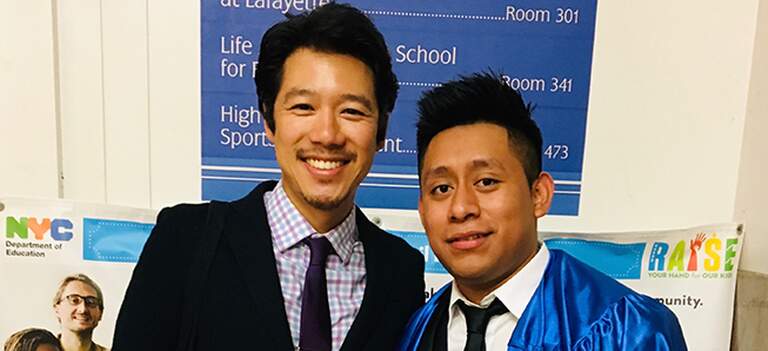Each year, we recruit thousands of mentors to work with students, and we make a special effort to seek out mentors of color. This is because the vast majority of students we serve—93 percent this year—are people of color. Currently 44 percent of iMentor volunteers are people of color.
For Asian Pacific American History month, we spoke with Jeff Tang, a composer and creative producer who lives in New York City, about his experience mentoring a student in Brooklyn. Jeff shared why he was eager to mentor a new immigrant, and how his own experience informed his mentoring.
Why did you become a mentor?
One of my old roommates, Ellen Mahoney, used to work at iMentor way back in the day. She was always saying, “We need male mentors.” But I never felt like I had time.
Then the 2016 election happened. It really revealed how exposed the immigrant population was. Growing up as a person of color in this country, and having lived abroad, I could relate to that sense of otherness. How could I not become an activist in some sense?
When iMentor asked if I would be willing to mentor a student at the International High School at Lafayette, the overwhelming majority of the student body is international, I was thrilled.
Why do students need mentors of color?
I grew up in Southern California and there were a handful of Asian kids in my class of 500.
Like most first-generation American kids, I grew up "white-aspiring." Even in a Chinese-American household with immigrant parents, most of the cultural, behavioral, even spiritual models I was ingesting and aspiring toward were Western European. Assimilation, though, can have insidious effects on one's sense of self-worth and identity, particularly if you're of color in this country.
As an artist, I think it’s common that, when we're younger, we follow the creative path because we are in some way disassociated from the reality we are in and we want to create our own reality. Have you seen the movie “Columbus,” with John Cho? It’s this quiet, intensely beautiful film. I’d never seen an Asian American male character so fully realized. I recently had an opportunity to meet Kogonada, the director, and say to him , “If I had seen this film when I was growing up, my life would have been so different. I don't know what my self-image would have been like, but I probably would have moved through the world with a lot less suspicion and lot less self-doubt.” That’s the gift of modeling, of seeing yourself in another person. I joined iMentor hoping I could give that gift to somebody else.
So as a POC mentor, I want to stress that the system does not have to be binary; there's room for a multitude of sociocultural identities that I hope young people today will recognize as sources of pride and power.
Tell me about meeting your mentee.
My mentee, Jordi, is from Guatemala, and his English language skills were pretty rudimentary when he arrived here. I had lived in Spain and Argentina, so I was pretty comfortable in Spanish.
But what Jordi needed was to speak English. So we brokered a deal: most of the interaction had to be in English, and then we could take a break and he could help me with my Spanish. That was an important part of our relationship—him feeling like he was contributing to my growth. It wasn't a one-way thing.
Jordi’s a great kid. He’s incredibly social and was, in many ways, the cool kid in high school. The entire first year of mentorship was my working to establish a sense of accountability and honesty with him: “Don't tell me what you think I want to hear—tell me the truth.” From there we were able to build toward real goals.
He was always motivated and had college as his primary goal. He was also working a lot, first in a restaurant, and then as a driver for a car service to help support his family and siblings. Now he’s a freshman at Kingsborough Community College. His entire journey, from Guatemala to college, took real work and focus on his part, and has been incredibly inspiring.
How has Jordi been affected by the COVID-19 crisis?
He's not driving right now, and I think that makes him restless. He's doing classes online and the classes are hard: for ESL students, online learning is yet another barrier. He also has two siblings at home, and still maintains some caretaking responsibilities for them. He has a lot of family—his cousins live in the same house—so he has good emotional support. He’s staying positive, and seems to be in good cheer. And I bet he gets to play his favorite video games more than I’d like him to. But during a quarantine, I’d make the exception.
We believe connections can affirm, support, and uplift. Mentor a student who will thrive with your support. Apply today.

